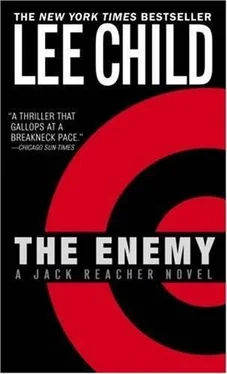I was pretty sure Beatrice was my mother.
I flipped back to the pages of studio portraits and found her. It was some kind of a school photograph. She looked to be about sixteen in it. The caption was Béatrice en 1947 . Beatrice in 1947. I flipped back and forth through the text and pieced together Lamonnier’s narrative thesis. There were two main tactical problems with the Human Railroad. Finding the downed airmen was not one of them. They fell out of the sky, literally, all over the Low Countries, dozens of them every moonless night. If the Resistance got to them first, they stood a chance. If the Wehrmacht got to them first, they didn’t. It was a matter of pure luck. If they got lucky and the Resistance got to them ahead of the Germans, they would be hidden, their uniforms would be exchanged for some kind of plausible disguises, forged papers would be issued, rail tickets would be bought, a courier would escort them on a train to Paris, and they would be on their way home.
Maybe.
The first tactical problem was the possibility of a spot check on the train itself, sometime during the initial journey. These were blond corn-fed farm boys from America, or redheaded British boys from Scotland, or anything else that didn’t look dark and pinched and wartime French. They stood out. They didn’t speak the language. Lots of subterfuges were developed. They would pretend to be asleep, or sick, or mute, or deaf. The couriers would do all the talking.
The second tactical problem was transiting Paris itself. Paris was crawling with Germans. There were random checkpoints everywhere. Clumsy lost foreigners stuck out like sore thumbs. Private automobiles had disappeared completely. Taxis were hard to find. There was no gasoline. Men walking in the company of other men became targets. So women were used as couriers. And then one of the dodges Lamonnier dreamed up was to use a kid he knew. She would meet airmen at the Gare du Nord and lead them through the streets to the Gare du Lyon. She would laugh and skip and hold their hands and pass them off as older brothers or visiting uncles. Her manner was unexpected and disarming. She got people through checkpoints like ghosts. She was thirteen years old.
Everyone in the chain had code names. Hers was Béatrice. Lamonnier’s was Pierre.
I took the blue cardboard jewel case out of the box. Opened it up. Inside was a medal. It was La Medaille de la Résistance. The Resistance Medal. It had a fancy red, white, and blue ribbon and the medal itself was gold. I turned it over. On the back it was neatly engraved: Josephine Moutier . My mother.
“She never told you?” Summer said.
I shook my head. “Not a word. Not one, ever.”
Then I looked back in the box. What the hell was the garrote about ?
“Call Joe,” I said. “Tell him we’re coming over. Tell him to get Lamonnier back there.”
We wereat the apartment fifteen minutes later. Lamonnier was already there. Maybe he had never left. I gave the box to Joe and told him to check it out. He was faster than I had been, because he started with the medal. The name on the back gave him a clue. He glanced through the book and looked up at Lamonnier when he recognized him in the author photograph. Then he scanned through the text. Looked at the pictures. Looked at me.
“She ever mention any of this to you?” he said.
“Never. You?”
“Never,” he said.
I looked at Lamonnier. “What was the garrote for?”
Lamonnier said nothing.
“Tell us,” I said.
“She was found out,” he said. “By a boy at her school. A boy of her own age. An unpleasant boy, the son of collaborators. He teased and tormented her about what he was going to do.”
“What did he do?”
“At first, nothing. That was extremely unsettling for your mother. Then he demanded certain indignities as the price of his continued silence. Naturally, your mother refused. He told her he would inform on her. So she pretended to relent. She arranged to meet him under the Pont des Invalides late one night. She had to slip out of her house. But first she took her mother’s cheese cutter from the kitchen. She replaced the wire with a string from her father’s piano. It was the G below middle C, I think. It was still missing, years later. She met the boy and she strangled him.”
“She what ?” Joe said.
“She strangled him.”
“She was thirteen years old.”
Lamonnier nodded. “At that age the physical differences between girls and boys are not a significant handicap.”
“She was thirteen years old and she killed a guy ?”
“They were desperate times.”
“What exactly happened?” I said.
“She used the garrote. As she had planned. It’s not a difficult instrument to use. Nerve and determination were all she needed. Then she used the original cheese wire to attach a weight to his belt. She slipped him into the Seine. He was gone and she was safe. The Human Railroad was safe.”
Joe stared at him. “You let her do that?”
Lamonnier shrugged. An expressive, Gallic shrug, just like my mother’s.
“I didn’t know about it,” he said. “She didn’t tell me until afterward. I suppose at first my instinct would have been to forbid it. But I couldn’t have taken care of it myself. I had no legs. I couldn’t have climbed down under the bridge and I wouldn’t have been steady enough for fighting. I had a man loosely employed as an assassin, but he was busy elsewhere. In Belgium, I think. I couldn’t have afforded the risk of waiting for him to get back. So on balance I think I would have told her to go ahead. They were desperate times, and we were doing vital work.”
“Did this really happen?” Joe said.
“I know it did,” Lamonnier said. “Fish ate through the boy’s belt. He floated up some days later, a short distance downstream. We passed a nervous week. But nothing came of it.”
“How long did she work for you?” I asked.
“All through 1943,” he said. “She was extremely good. But her face became well known. At first her face was her guardian. It was so young and so innocent. How could anyone suspect a face like that? Then it became a liability. She became familiar to les boches . And how many brothers and cousins and uncles could one girl have? So I had to stand her down.”
“Did you recruit her?”
“She volunteered. She pestered me until I let her help.”
“How many people did she save?”
“Eighty men,” Lamonnier said. “She was my best Paris courier. She was a phenomenon. The consequences of discovery didn’t bear thinking about. She lived with the worst kind of fear in her gut for a whole year, but never once did she let me down.”
We all sat quiet.
“How did you start?” I asked.
“I was a war cripple,” he said. “One of many. We were too medically burdensome for them to want us as hostage prisoners. We were useless as forced laborers. So they left us in Paris. But I wanted to do something. I wasn’t physically capable of fighting. But I could organize. Those are not physical skills. I knew that trained bomber crews were worth their weight in gold. So I decided to get them home.”
“Why would my mother go her whole life without mentioning this stuff?”
Lamonnier shrugged again. Weary, unsure, still mystified all those years later.
“Many reasons, I think,” he said. “France was a conflicted country in 1945. Many had resisted, many had collaborated, many had done neither. Most preferred a clean slate. And she was ashamed of killing the boy, I think. It weighed on her conscience. I told her it hadn’t been a choice. It wasn’t a voluntary action. I told her it had been the right thing to do. But she preferred to forget the whole thing. I had to beg her to accept her medal.”
Читать дальше












